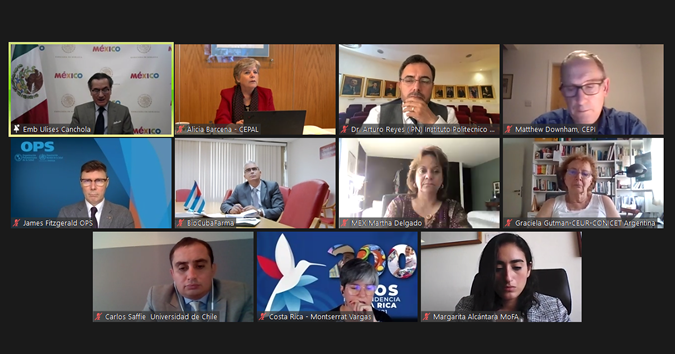Authorities and Experts Debate on Strategies to Boost Vaccine Production Capacities in Latin America and the Caribbean
Work area(s)
On February 24 and 25, 2022, the Second Regional Technical Workshop for Vaccine Manufacturing in Latin America and the Caribbean was held as a result of the cooperation and joint efforts made by the Government of Mexico, CEPI, PAHO and ECLAC.

More than 70 international authorities, experts and stakeholders from all over Latin America and the Caribbean met at the Second Regional Technical Workshop for Vaccine Manufacturing in Latin America and the Caribbean, as a follow-up to the First Workshop held at the end of October 2021. This virtual event was co-organized by the Ministry of Foreign Affairs of Mexico, the Coalition for Epidemic Preparedness Innovations (CEPI), the Economic Commission for Latin America and the Caribbean (ECLAC) and the Pan American Health Organization (PAHO).
In the course of the two days of the meeting, government and private sector representatives as well as members of the scientific community and civil society, exchanged their points of view on the current situation of vaccine production in Latin America and the Caribbean, especially regarding the issues that the private sector face. During this virtual discussion, its participants agreed on the importance of the public sector to promote financing opportunities for improving the production of vaccines and medicines.
At the beginning of the Workshop, Martha Delgado Peralta, Undersecretary for Multilateral Affairs and Human Rights of Mexico, highlighted the importance of events like this one to respond to future health crises, taking into account the specific conditions of the region. In addition to that, she mentioned that it is worth exploring the capacity of global public investments to build a fairer future for all countries.
Similarly, Dr. Alicia Bárcena, Executive Secretary of ECLAC, explained the relevance of continuing with the implementation of the Plan for self-sufficiency in health matters in Latin America and the Caribbean, which was designed and presented by the institution that she heads. The Plan was uninamously approved last 18 September, 2021, by the Heads of State and Governments of the 32 countries composing the Community of Latin American and Caribbean States (CELAC).She stressed that the Plan as well as these Regional Technical Workshops provide the necessary scaffolding to achieve the objective of strengthening the capacities of the region, beyond the advances in the vaccination plans of each country. She added that reaching self-sufficiency in health matters goes beyond development and research, manufacturing and distribution of medicines and vaccines: it takes part of an integral development approach. Without health there’s no development, it is impossible to move forward economically.
Likewise, Dr. Friederik Kriestensen, Deputy Executive Director of CEPI, mentioned that for the organization he represents these spaces for discussion are quite important in order to achieve a local point of view about problems and needs that exist in the region, before establishing a global health plan for future emergencies.
Finally, in her speech, Dr. Carissa F. Etienne of PAHO highlighted the experience that the agency she heads has had in the reaction against the COVID-19 pandemic. In this regard, she mentioned that PAHO facilitates dynamism between the private and public sectors throughout Latin America and the Caribbean. At the same time, she included the need to continue promoting this type of initiatives to build suitable platforms for everyone.
This Second Workshop is an ongoing effort made by Mexico and other institutions with the aim of strengthening the region's capacities in health matters. In pursuit of these objectives, a Third Workshop is planned to serve as a forum to discuss the specific challenges of the region. The goal is that these results can be shared at the next General Assembly of the World Health Organization, so Latin America and the Caribbean can expose its own perspective on the difficulties that international community has to face in order to strengthen the global health architecture.
Related content

Authorities and Experts Highlight the Importance of Cooperation between Countries and Sectoral Institutions to Boost Vaccine Manufacturing in Latin America and the Caribbean
First Regional Technical Workshop for the Manufacture of Vaccines in Latin America and the Caribbean was held on October 28 and 29, 2021, organized by the Government of Mexico, CEPI, PAHO and ECLAC.
Type
Country(ies)
- Latin America and the Caribbean
- Mexico